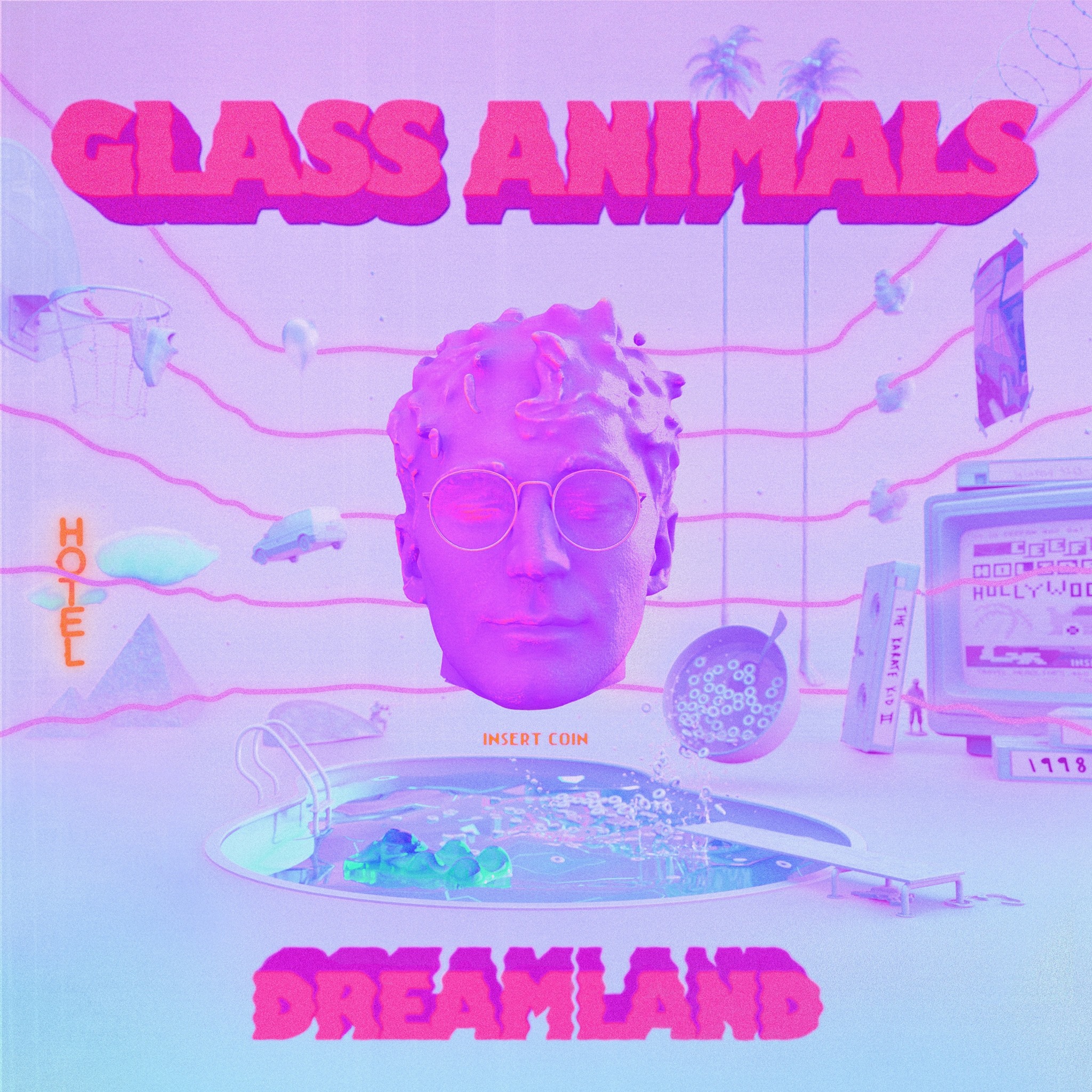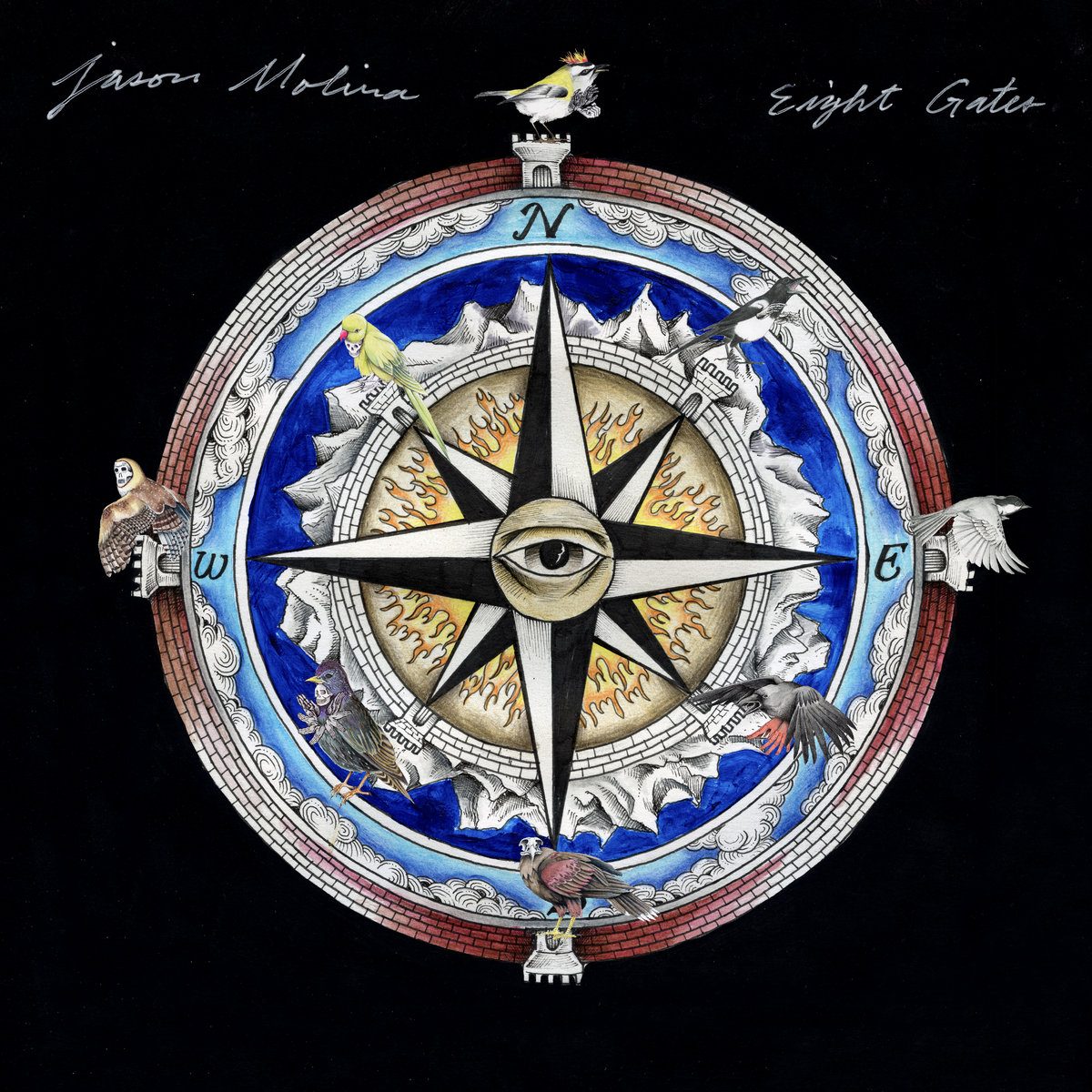Washed Out – ‘Purple Noon’
 Sounds like … a fever dream in a tropical summer night.
Sounds like … a fever dream in a tropical summer night.
Really nothing could sum up the sound and aesthetics of Ernest Greene better than the artwork of his fourth Washed Out full-length. Drenched in shimmering pink and blue, in front of a horizon, on top of a majestic white building while wearing clothes that could’ve been taken directly from the year 1986. And don’t forget about the moon, right? Greene’s music was always meant to soundtrack warm summer nights, trippy daydreams and any kind of romantic scenery you could imagine. That’s what made is iconic 2011 debut Within And Without such fitting blueprint for the chillwave movement back then. 2013’s Paracosm perfected that formula and actually saw Greene embrace traditional instrumentation in a really fitting way. And while 2017’s Mister Mellow was a challenging 360 audio/visual experience that saw Washed Out flirting with hip hop vibes it was slightly unsatisfying for those like me who were longing for those original chillwavin’ vibes. Purple Noon is a return to that feeling but Greene is obviously not repeating this formula in its entirety, instead he moves it forward into a more defined pop direction in which every aspect of the sound perfectly matches with the others, just like the way the artwork is composed. Album number four is as Washed Out as a Washed Out record can be – shimmering and prancing through warm colours.
It’s also way more cohesive in terms of sequencing than Mister Mellow was as Greene delivers an ongoing vibe throughout its duration. “Is it too late to fall in love tonight?” he asks emotionally on the opening Too Late which already sets the mood straight: sonic synthesizers, a wobbling bassline, big 80s drums and that special lush character in his vocal performance which always gives his music the vibe of a sweet summer breeze. However, this time the American artist polished up his sound and isn’t afraid to deliver catchy 80s pop hooks like on the mighty Time To Walk Away or the grooving Hide. He isn’t even afraid to head for stadium territory like in the mighty kitsch ballad Don’t Go which sounds like a forgotten M83 gem that’s peen put through a distorted filter system. However, there’s always plenty of space for those trippy and hypnotic Washed Out sounds like Face Up and Paralyzed which still breathe that chillwavin vibe of pre-Instagram filter aesthetics. Game Of Chance is a reduced ride on a reverbed acoustic ballad that brings this Purple Noon quite close to the iconic Pink Moon. A more reduced Greene record would actually quite thrilling but this is obviously not the season for it. Purple Noon dreams in cinemascope and pastel colour range. It’s a dazzling piece of epic dream pop and your perfect soundtrack for a summer of escapism. Needless to say, it couldn’t have arrived at a better timing, right? (Norman Fleischer)
Stream It: ► Spotify / ► Apple Music / ► Bandcamp
Glass Animals – ‘Dreamland’
 Sounds like … a nostalgic journey through the past.
Sounds like … a nostalgic journey through the past.
Actually, the new Glass Animals record should already have been released a few weeks ago but paying respect to the Black Lives Matter movement, they decided to postpone the release. Dreamland is the name of their third full length which feels like a retrospective journey through the life of Glass Animals’ frontman Dave Bayley. The entire album is about the personal experiences he has made in his life so far – with all of its ups and downs. The idea to record a new LP came up in 2018 when Joe Seaward, the band’s drummer, had a horrible bike accident. He had to stay in the hospital for some time and it wasn’t even sure whether he would survive the injuries. Luckily he did – otherwise there probably wouldn’t be a new Glass Animals record by now. In those hard times it was important for Dave to immerse himself in memories, as the future of his friend and the band were uncertain and confusing. It’s like he got lost in his own dreamland to escape the terrifying reality.
Even though the story behind the new album sounds pretty depressing, the music isn’t at all. Dreamland is much more of a positive journey through experiences from the past. Experiences we all made or will make some day: the childhood, the first love, breakups, thoughts of hate, and so on. The record sounds like you would expect another Glass Animals LP to sound like: relaxing R’n’B tunes meet HipHop beats and indie pop elements. It feels like the boys predicted the future; Dreamland is an album for uncertain times just like we are all experiencing them at the moment. It’s a record for everyone who needs to escape reality by floating into memories of the past. (Miriam Wallbaum)
Stream It: ► Spotify / ► Apple Music
Jason Molina – ‘Eight Gates’
 Sounds like … a ghostly wave goodbye.
Sounds like … a ghostly wave goodbye.
Like with most estate recordings of passed musicians, it’s easiest to tell the story from the ending. But actually, with this release of the late Jason Molina it’s best to put things into perspective first: a) Eight Gates is definitely more a Molina/Songs:Ohia-recording than it is a Magnolia Electric Co. album. Its hushed, fickle sound suits the songwriter Molina better than the bandleader Molina. b) the way it came into being is another tale that just adds up to the career of Jason Molina as a sorcerer of song, yes, but also that of a marvellous storyteller. It’s got everything in it: Historical fiction (the eighth gate of London), road adventure (the spider bite that kept him in solitude), pop cultural references (the offsprings of Jimi Hendrix‘ birds haunting the recording) – all in all this record is, in its narrative, a last, ghostly wave from the melancholic imposter called Jason Molina. But c) Eight Gates is not the fatal, ultimate album of a dying man with death lingering in every second. It defies the tragic and too early death of Molina. Or as he jokingly puts it at the beginning of She Says: „The perfect take is: as long as the person singing is still alive.“
It is the beauty of this recording that it also transports the process of the recording itself. „Everybody shut up, this my record“ Molina says at the beginning of The Crossroad + The Emptiness. And indeed it is. It’s always been quite hard to perceive and understand his music fully just from listening to it. There’s always also something deeply personal, hidden and magical about it – mostly in Molina‘s voice that so carefully transports and transcends his words into the great wide open. When he sings of the Old Worry it really sounds like something inherited over centuries. And there are moments on Eight Gates that painfully remind us of Molinas timeless strength. Fire on the Rail presents him at his most powerful: His voice opening the room for a ghostly, dark folk sketch that paints a picture in your head by only 2 minutes of running time. If this is where Molina was heading for again at that point of his career, who knows – maybe he would have accomplished a second The Lioness. Sadly, and that’s where we of course have to tell the story from its ending: All the surroundings, the exile in London, his fantastic stories of spiders and birds, the reason why we have to take this album as a belated gift, it’s all based on the very earthly and sickening reason that Molina‘s alcoholism had cost him everything. And took him from us. We’re left with that. And there’s no song Molina could have written to exorcise that ghost. (Henning Grabow)
Stream It: ► Spotify / ► Apple Music / ► Bandcamp
Husky – ‘Stardust Blues’
 Sounds like … a magic shimmer of light that shines through at the end of a really long night.
Sounds like … a magic shimmer of light that shines through at the end of a really long night.
It is quite hard to imagine a more poetic appeal than the one that surrounds the creation of Husky’s fourth record Stardust Blues. In itself designed as a narrative that follows a character for a whole day on a rambling stride through Melbourne, the album was written and partially recorded at the Westbury Hotel, an artist commune that served as a creative hub for artists and musicians alike. Only recently, the 1920s mansion had to face its last days and was torn down to make way for an apartment building block just as Husky was about to finish working on the record. But even so, the Melbourne indie-quartet ensured the magic of the community lived on in their songs. „Out of destruction comes creation, out of death comes rebirth“, front singer Husky Gawenda sums up the spirit of Stardust Blues, and that appears like a motive that runs through both the songs themselves as well as the setting in which these were created.
No question, there is a gleam of James Joyce’s classic Ulysses blinking through the structure of the album. The place however is Melbourne, not Dublin, and what we get is a narrator who on his day’s long journey, is encountering friends, falling in and out of love, brooding over fears, hopes and dreams, and turning his inside out in the course of his 24-hour odyssey through the city. The musical design comes across just as multi-faceted as an entire day might be. More lush and complex, at times dreamy and playful, Stardust Blues ranges from softer tunes such as the initial Cut Myself Loose, which balances a steady piano line next to an ambient guitar pattern, to more vibrant pieces like the following Light A Cigarette. The latter is a vigorous testimony of Husky’s capacity for creating rhythms and riffs that stick with you, if you like it or not. From the subdued Papier-mâché Eyes, to playful gems like Bruised Eye or the melancholic and atmospheric quality of Wristwatch or Kinetic, the record hits a gloomy sonic ambiance, drifting away from the eclectic and more straightforward rock sound of 2017’s Punchbuzz. And yet, Husky successfully balance their craft, exploring the full range between progressive guitar virtue and moody sound palettes, which eventually illuminate the „light and safety“, the character walks towards the end of his journey. „Come on, let’s go“, Gawenda invites us on the final My Darling Ghost. Well, who wouldn’t want to come along after experiencing all of this? (Andreas Peters)
Stream It: ► Spotify / ► Apple Music
Max Richter – ‘Voices’
 Sounds like … an outpouring of orchestral emotion for the dark times we live in.
Sounds like … an outpouring of orchestral emotion for the dark times we live in.
Over the past decade, Max Richter has become synonymous with the intelligent, neoclassical movement that’s seen the rise of a whole new breed of musician. He’s an artist who’s incredibly leftfield compositions have touched the mainstream space, notably through his collaborations film and TV soundtracks and worldwide online critical acclaim. His music soon found fertile ground through playlisting, with his tracks featuring across a worldwide network of ‘sleep’ and ‘focus’ style playlists resulting in over one billion streams. The new album Voices, continues his epic and cinematic style, with a view to examine issues of human rights across the globe.
So it goes without saying this probably isn’t an album for your casual, easy-going music fan. It’s an emotive journey of reflection and the work of a true virtuoso in his field. The album is overdubbed throughout with recordings of the Universal Declaration of Human Rights. This, juxtaposed against the sombre and emotive tone of the album, powerfully illustrates the idea that these laws are being repeatedly disregarded worldwide. Composed over a 10-year period, you can genuinely hear the hard work and incredible attention to detail that’s gone into each track. A mostly orchestral pursuit, with subtle electronic layers throughout. It’s a powerful blend of epic, orchestral moments of bliss such as on Murmeration and Chorale. And light, subtle piano solo compositions such as Prelude. The lead single Origins deserves a special mention for combining the two in an intensely emotive composition. Voices, like most of Richter’s work, is clearly an album for the connoisseur. This is not an album you’ll easily sit through if you’re not already a fan of the genre, but if you are, you won’t find much better. (Aidan Grant)
Stream It ► Spotify / ► Apple Music


